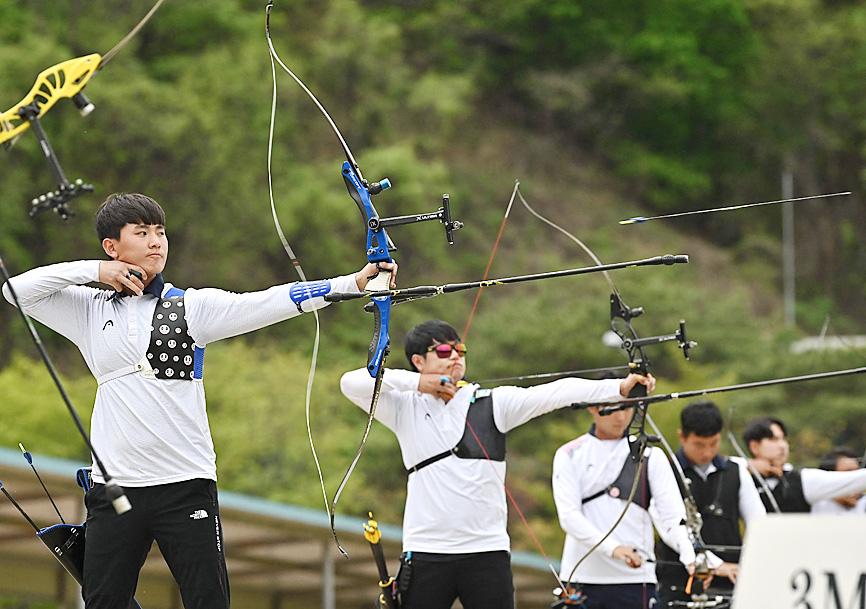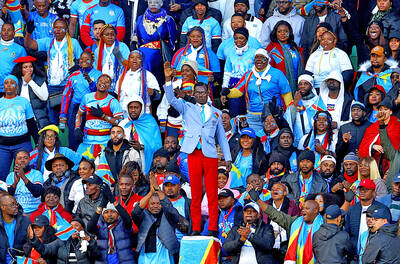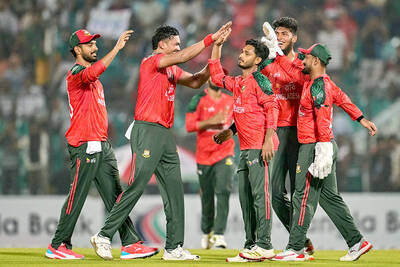Bungee jumping, baseball stadiums and a major automaker: The recipe for South Korea’s extraordinary dominance of Olympic archery is unorthodox, but pointedly effective.
South Korean archers have ruled the sport for decades, winning 23 out of the 34 Olympic golds awarded since 1984, including all four golds at the 2016 Rio de Janeiro Games.
The women have won all eight team titles since that discipline was added at the 1988 Seoul Games, while the men have taken five out of eight.

Photo: AFP
Theories abound as to why South Koreans are so good at archery, including vague mumblings about their “sensitive fingers” — a real or imagined physical trait also cited when discussing the nation’s dominance in women’s golf.
Archery is unusually lucrative in the country, with businesses and local governments owning more than 30 teams in competitive leagues and paying their members’ salaries — there are more than 140 professionals, the Korea Archery Association (KAA) said.
The country’s Olympic selection process is grueling and ruthless: The three male and female archers that are top ranked at multiple trials over several months get the slots, with no credit given for previous victories, records or standings.
“There is a saying that if you finish first in South Korea, you can win gold at the Olympics,” said Kim Hyung-tak, who coached the national team for the 1984 Los Angeles Games.
Even top stars can be cast aside in the relentless pursuit of gold. Among those representing South Korea in Tokyo will be a teenager and three women archers with no Olympic experience, while reigning Olympic champions Ku Bon-chan and Chang Hye-jin failed to make the team.
“It’s not that they’ve lost their skill,” KAA vice chairman Jang Young-sool said. “It just means that South Korea has many skilled archers.”
In the 1970s, as tension mounted on the Korean Peninsula, South Korea’s then-military government encouraged boys to train in taekwondo and girls to learn archery.
Kim trained dozens of teachers from schools across the nation so that they could instruct their pupils.
Archery lacked funding and needed facilities, Kim said, with competitions being held in drained swimming pools and results to match, despite a centuries-long tradition in the sport.
Ahead of the Seoul Games, then-South Korean president Chun Doo-hwan ordered the country’s major businesses to sponsor national sports federations to try to ensure a respectable performance.
The Hyundai Group was allocated archery, with a son of its founder becoming KAA chairman. The company has reportedly pumped at least US$40 million into the sport over the past three decades.
Top researchers from Hyundai have carried out scientific studies to improve the performance of archers, and Jang said that the firm’s long-term backing has been “essential.”
Hyundai Motor chairman Euisun Chung has been head of the KAA since 2005.
Jang credits him with the team’s success in Rio after he provided a customized bus equipped with beds, yoga mats and showers to ensure that the athletes were well-rested.
Chung was the first person that Ku Bon-chan ran to after winning the individual men’s gold, and the team showed their appreciation by tossing the Hyundai executive into the air.
The team has adopted unique training methods, ranging from bungee jumping, to control nerves, to practicing at a full baseball stadium, to handle the noise of large crowds.
Ahead of the 2012 London Games, they studied the British capital’s rain and wind patterns, and scoured South Korea for a training location with similar weather, finally picking Namhae on the often damp southern coast.
“The weather was actually terrible for the final match,” said Jang, who was head coach at the time. “The Chinese team were flustered, while our archers competed calmly and ended up winning by a single point.”
This year, the team has practiced at a replica of the arena in Tokyo, reproducing even the sounds the archers are expected to hear, from chirping birds to Japanese and English announcements.
First-time Olympian Kang Chae-young, 25, said that Tokyo would be “much more familiar,” as a result.
“I hope to be able to show my skills and do my best without any regrets,” she added.

MOTHER KNOWS BEST: Warriors’ coach Kerr said his 91-year-old mother criticized him for his attitude toward officials that led to his ejection from Monday’s game Shai Gilgeous-Alexander on Wednesday rescued the Oklahoma City Thunder with a game-tying buzzer-beater before finishing with 46 points in a 129-125 overtime victory against the Utah Jazz. The reigning NBA champions looked to be heading for a third straight loss after the Jazz inched into a 114-112 lead following Lauri Markkanen’s layup with just three seconds remaining in the fourth quarter. However, NBA Most Valuable Player Gilgeous-Alexander drained a superb 13-foot jump shot to tie it up at 114-114 as the buzzer sounded to send the game into overtime. Gilgeous-Alexander then took over in the extra period with nine points as the Western

Manchester City have confirmed defender Josko Gvardiol suffered a broken leg in Sunday’s 1-1 draw with Chelsea at the Etihad Stadium. Gvardiol was one of two City centerbacks who went off injured in the second half, along with Ruben Dias, before Enzo Fernandez scored a stoppage-time equalizer for the visitors. The draw left second-placed City six points behind English Premier League leaders Arsenal. City, announcing Gvardiol sustained a tibial fracture to his right leg, added in a statement issued on Monday: “The defender will have surgery later this week and assessment remains ongoing to ascertain the full extent of the

His team were knocked out of the Africa Cup of Nations (AFCON) in agonizing fashion on Tuesday, but the Democratic Republic of the Congo’s (DR Congo) human statue Michel Kuka Mboladinga would be remembered as the tournament’s most remarkable supporter. The colorfully dressed Kuka has earned fame as the fan who stands completely immobile throughout his team’s games, looking toward the sky with his right arm raised and palm open. He has become a media star and on Tuesday was accompanied by a delegation of several hundred Congolese supporters whose trip to Morocco was paid for by the country’s government. They took their

Bangladesh will not play their Twenty20 World Cup matches in India after Mustafizur Rahman was released by his Indian Premier League team amid growing tensions between the countries, Bangladesh’s sports adviser Asif Nazrul said on Sunday. Kolkata Knight Riders said on Saturday they had released the Bangladeshi bowler after being told to do so by the Board of Control for Cricket in India (BCCI). Bangladesh are scheduled to play three Twenty20 World Cup matches in Kolkata next month, with the Feb. 7-March 8 tournament being cohosted by India and Sri Lanka. “Bangladesh will not go to India to play the